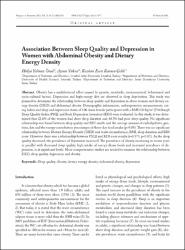| dc.contributor.author | Önal, Hülya Yılmaz | |
| dc.contributor.author | Yüksel, Aysun | |
| dc.contributor.author | Çelik, Kezban Esen Karaca | |
| dc.date.accessioned | 2023-12-01T12:14:43Z | |
| dc.date.available | 2023-12-01T12:14:43Z | |
| dc.date.issued | 2021 | en_US |
| dc.identifier.citation | Yılmaz Önal, H., Yüksel, A. ., & Karaca Çelik, K. E. . (2021). Association Between Sleep Quality and Depression in Women with Abdominal Obesity and Dietary Energy Density: Sleep Quality and Depression in Women with Abdominal Obesity and Dietary Energy Density. Progress in Nutrition, 23(2), e2021120. https://doi.org/10.23751/pn.v23i2.11177 | en_US |
| dc.identifier.uri | https://hdl.handle.net/20.500.12900/213 | |
| dc.description.abstract | Obesity has a multifactorial effect caused by genetic, metabolic, environmental, behavioral, and socio-cultural factors. Depression and a high-energy diet are observed in sleep deprivation. This study was planned to determine the relationship between sleep quality and depression in obese women and dietary energy density (DED) and abdominal obesity. Demographic information, anthropometric measurements, eating habits, and sleep and depression status of 106 obese female participants with a BMI ≥30 kg/m2 (Pittsburgh Sleep Quality Index-PSQI and Beck Depression Inventory (BDI) were evaluated. In this study, it was determined that 22.6% of the women had short sleep duration and 44.3% had poor sleep quality. No significant relationship was found between sleep quality and BDI results and the average amount of carbohydrates, proteins, fats, and the energy contribution percentages of three-day food intake (p>0.05). There was no significant relationship between Dietary Energy Density (DED) and waist circumference, BMI, sleep duration, and BDI score. However, there was a relationship between PSQI and BDI score results (r=0.373, p<0.01). As sleep quality decreased, the prevalence of depression increased. The prevalence of obesity increasing in recent years in parallel with decreased sleep quality, high intake of energy-dense foods, and increased prevalence of depression, is at significant levels. More comprehensive studies are needed to examine the relationship between DED, sleep quality, depression, and obesity. | en_US |
| dc.language.iso | eng | en_US |
| dc.publisher | MATTIOLI 1885 | en_US |
| dc.relation.isversionof | 10.23751/pn.v23i2.11177 | en_US |
| dc.rights | info:eu-repo/semantics/openAccess | en_US |
| dc.subject | Uyku kalitesi | en_US |
| dc.subject | Sleep quality | en_US |
| dc.subject | Obezite | en_US |
| dc.subject | Obesity | en_US |
| dc.subject | Diyet enerji yoğunluğu | en_US |
| dc.subject | Dietary energy density | en_US |
| dc.subject | Abdominal obezite | en_US |
| dc.subject | Abdominal obesity | en_US |
| dc.subject | Depresyon | en_US |
| dc.subject | Depression | en_US |
| dc.title | Association Between Sleep Quality and Depression in Women with Abdominal Obesity and Dietary Energy Density | en_US |
| dc.type | article | en_US |
| dc.department | İstanbul Atlas Üniversitesi, Sağlık Bilimleri Fakültesi, Beslenme ve Diyetetik Bölümü | en_US |
| dc.authorid | 0000-0001-8424-2661 | en_US |
| dc.contributor.institutionauthor | Önal Yılmaz, Hülya | |
| dc.identifier.volume | 23 | en_US |
| dc.identifier.issue | 2 | en_US |
| dc.identifier.startpage | 1 | en_US |
| dc.identifier.endpage | 9 | en_US |
| dc.relation.journal | PROGRESS IN NUTRITION | en_US |
| dc.relation.publicationcategory | Makale - Uluslararası Hakemli Dergi - Kurum Öğretim Elemanı | en_US |

















